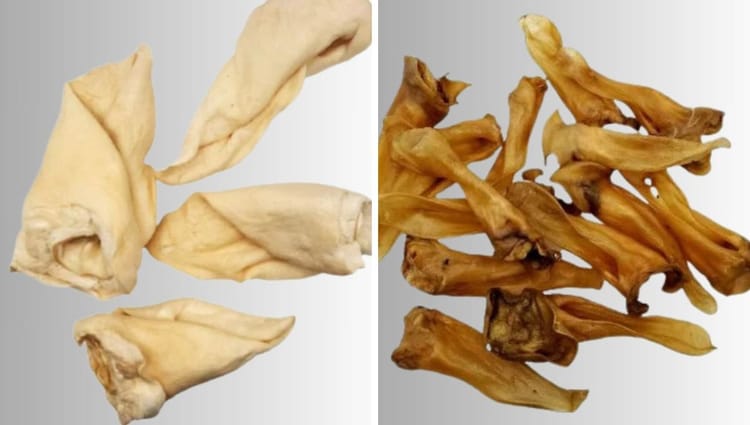Biting Back: Navigating Bully Sticks and the Delicate Dance with Digestion in Your Furry Friends

In the quest for optimal canine well-being, pet owners often find themselves navigating the vast landscape of pet products, searching for the perfect balance between tasty treats and nutritional benefits. Enter bully sticks, a popular and wholesome option that not only satiates your furry friend's love for chewing but also offers surprising benefits for their digestive health.
As conscientious pet parents, understanding the connection between these all-natural treats and your dog's digestion becomes pivotal in ensuring a happy, healthy, and contented furry companion.
In this blog post, we'll delve into the world of bully sticks, exploring their origin, composition, and the digestive wonders they bring to the table. So, let's chew into the details and uncover how these delectable treats can become more than just a delightful pastime for your canine companion.
Key Takeaways:
- Understand the potential link between bully sticks and diarrhea in dogs.
- Learn how to identify symptoms and take appropriate action if your dog experiences digestive issues.
- Discover preventive measures to ensure your dog enjoys bully sticks safely.
Bully sticks are a popular choice among dog owners looking for a long-lasting, natural chew treat for their pets. However, as with any dog treat, there can be potential side effects, including digestive issues like diarrhea. In this article, we'll explore the relationship between bully sticks and diarrhea, how to identify and address the problem, and ways to prevent it from happening in the future.
What Are Bully Sticks?
Bully sticks are single-ingredient dog treats made from the dried, cooked, or smoked penile tissue of bulls or steers. They are prized for their durability and their ability to satisfy a dog's natural chewing instinct. Unlike some other chews, bully sticks are fully digestible, which is a significant advantage for pet owners concerned about the risks of blockages from indigestible materials.
Despite their benefits, bully sticks can sometimes cause digestive upset in dogs. The high protein content, while generally healthy, can be too rich for some dogs, especially if they are not used to such treats. Additionally, the chewing process can lead to small pieces being swallowed, which may upset a dog's stomach.
Recognizing the Symptoms of Diarrhea
Diarrhea in dogs can manifest in several ways, but the most common symptoms include loose, watery stools, increased frequency of defecation, and a sense of urgency to go outside. In some cases, dogs may also exhibit signs of abdominal pain, lethargy, and loss of appetite. If your dog shows any of these symptoms after consuming a bully stick, it's important to monitor them closely.
It's crucial to differentiate between a single loose stool and ongoing diarrhea. Occasional loose stools can happen for a variety of reasons and may not be a cause for concern. However, persistent diarrhea, especially when accompanied by other symptoms, warrants a visit to the veterinarian to rule out more serious health issues.
The Role of Bully Sticks in Causing Diarrhea
Bully sticks, like any new addition to a dog's diet, can be the culprit behind gastrointestinal upset. The rich protein content and the fact that they are a novel food item for many dogs mean that their digestive systems may not be accustomed to processing such treats. Overindulgence is another common reason for diarrhea; giving your dog too large a piece or too many bully sticks can easily lead to an upset stomach.
Moreover, the quality of the bully sticks can also play a role. Low-quality or improperly processed bully sticks may contain bacteria or contaminants that can cause diarrhea or even more severe infections. It's essential to purchase bully sticks from reputable sources and to ensure they are appropriately stored and handled to minimize these risks.
Preventive Measures for Dog Owners
To prevent diarrhea related to bully sticks, start by introducing them slowly into your dog's diet. Give them a small piece and observe how they handle it before making it a regular treat. Also, ensure that your dog has access to plenty of fresh water, as chewing can increase their need for hydration, and dehydration can exacerbate digestive issues.
Choosing high-quality bully sticks is also vital. Look for treats that have been tested for safety and come from reputable manufacturers. Avoid those with added chemicals or preservatives, as these can increase the likelihood of digestive upset. Additionally, supervise your dog while they enjoy their bully stick to prevent them from swallowing large pieces that could cause gastrointestinal distress.
When to Consult a Veterinarian
If your dog develops diarrhea after consuming a bully stick, it's important to assess the severity of the situation. Mild cases may resolve on their own with a temporary diet change to bland, easily digestible foods. However, if diarrhea persists for more than a day, is accompanied by vomiting, blood, or a significant behavior change, or if your dog has preexisting health conditions, seek veterinary care immediately.
Your veterinarian can help determine the cause of the diarrhea and recommend the best course of action. This may include dietary adjustments, medication, or further diagnostic testing to ensure your dog's health and safety.
Summary
Bully sticks can be a healthy and enjoyable treat for many dogs, but they can also lead to diarrhea in some cases. By recognizing the symptoms, understanding the potential causes, and taking preventive measures, dog owners can help ensure their pets enjoy these treats without adverse effects. Always prioritize quality when selecting bully sticks and consult a veterinarian if any digestive issues arise.
FAQ Section
Q: Can bully sticks cause diarrhea in all dogs?
Not all dogs will experience diarrhea from bully sticks, but some may be more sensitive to the high protein content or may not be used to such treats. It's important to monitor your dog's reaction and adjust accordingly.
Q: How can I safely introduce bully sticks to my dog's diet?
Start with a small piece to see how your dog reacts and gradually increase the amount if there are no signs of digestive upset. Always provide fresh water and supervise your dog while they chew.
Q: What should I do if my dog gets diarrhea after eating a bully stick?
If the diarrhea is mild and your dog is otherwise acting normally, you may try a bland diet and remove the bully stick from their diet temporarily. If diarrhea persists or is severe, consult your veterinarian for advice.





